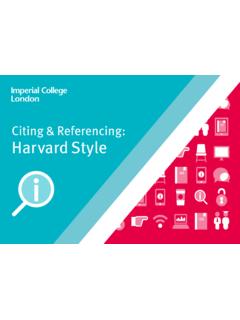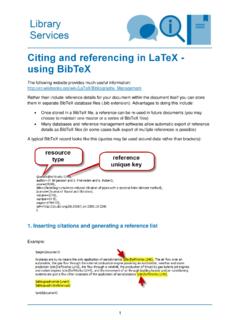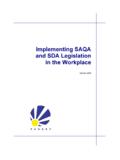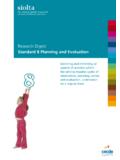Transcription of IMPERIAL COLLEGE LONDON
1 1 IMPERIAL COLLEGE LONDON GUIDELINES FOR MANAGERS CONDUCTING INVESTIGATIONS CONTENTS 1 Introduction 2 Principles of an Investigation 3 Informal action Informal action: Misconduct Informal action: Poor performance Informal action: Grievance 4 Mediation 5 Timeframe for Investigation 6 Roles and Responsibilities Who should conduct a formal investigation? Investigating Officer: Misconduct Investigating Officer: Poor Performance Investigating Officer; Grievance The role of the Investigating Officer Key points of the role of the Investigating Officer Balance of probabilities New or counter-allegations Suspension Contact between parties Managing sickness absence during the investigation process Managing grievances during the investigation process The role of the HR Representative in the investigation process Arrangements for notetaking during the investigation process The role of the Trade Union representative or work colleague during the investigation process Relationship with other Agencies Potential
2 Criminal offences 7 Planning and Preparing the Investigation Start of the Investigation Start of Investigation: Misconduct Start of Investigation: Poor Performance Start of Investigation: Grievance Witnesses External Witnesses Witnesses wishing to remain anonymous Confidentiality boundaries 2 Gathering information 8 Investigatory Interviews Preparation of investigatory interviews Questioning techniques for investigatory interviews Open questions Closed Questions Funnelling Questions Probing questions Awkward questions Leading questions Conducting formal investigatory Interviews Opening the investigatory interviews During the course of the investigatory Interview Evaluating the evidence Investigatory interview notes 9 Preparing an Investigation
3 Report Investigation report: Misconduct or Poor Performance Investigation report: Grievance 3 1 Introduction These guidelines have been written to assist Line Managers when carrying out investigations. It is expected that most workplace investigations could be carried out within this framework. The guidance contained within this document must be used in conjunction with the relevant COLLEGE Policy or Procedure, as determined by the nature of the investigation. Workplace investigations take many forms and may take place for many reasons. For example, an investigation may take place into performance issues where the member of staff is not sustaining the acceptable level of performance to meet the requirement of their role; or into a conduct issue where, for example, the member of staff is suspected of theft, dishonesty and/or other unethical practices; or unprofessional conduct (for example displaying inappropriate materials, fighting).
4 An investigation may also be initiated where a member of staff raises a grievance, for example whether they feel that they have been unfairly or unreasonably treated, and/or where they have concerns relating to an incident of harassment, bullying or victimisation. The COLLEGE is committed to thoroughly investigating all allegations/complaints and ensuring that all members of staff are treated fairly, consistently and with dignity and respect throughout the investigation process. The following is a list of the most common policies referred to during an investigation: Disciplinary and Poor Performance Policy Grievance Policy and Procedure (including harassment, bullying and victimisation) COLLEGE Charter and Statutes 2007 covering academic staff (Discipline, Grievance and Dismissal Procedures for Academic Staff) Policy and Response Plan for the Treatment of Fraud, Corruption and Irregularities (investigation conducted under the direction of the COLLEGE Secretary/Fraud Project Group) The main parties involved in the investigation will be.
5 The Complainant the member of staff raising the complaint or allegation that needs to be investigated The Respondent the accused member of staff / member of staff under investigation for conduct or performance issues The Witness a member of staff who has witnessed the event 2 Principles of an Investigation An investigation is a fact-finding process to establish the relevant evidence and circumstances of the case. The investigation must only focus on the nature of the allegation, complaint or incident, and should be approached in a non-judgmental manner guilt or innocence must not be assumed. The process may involve reviewing supporting records/documents as well as interviewing members of staff ( the complainant, respondent and witness(es)) and preparing a comprehensive report.
6 The investigation report will contain any relevant factual information, copies of witness statements and all other documentary evidence. The time taken to investigate will vary depending on the complexity of the case. The Investigating Officer needs to ensure that the investigation has been sufficiently thorough to ensure that all the relevant facts have been established, so that they are able to draw conclusions in relation to the specific allegation(s) or complaint(s). 4 The Investigating Officer must also be aware of sensitivities around allegations of harassment and bullying, and consider possible equality strands such as race, sex or disability discrimination.
7 The Investigating Officer needs to remain sensitive to these factors, even where they have not been raised directly as part of the allegations/complaint. 3 Informal Action Not all workplace investigations require a formal comprehensive approach. Depending on the nature of the allegation/complaint, sometimes an informal and relatively short investigation provides all the information needed to reach a conclusion and resolution. Where allegations or concerns have been raised in relation to an individual s conduct or performance, or where a grievance has been raised, in the first instance, and where appropriate, line managers and members of staff are encouraged to discuss and seek to address the concerns/complaints via informal routes.
8 Informal action: Misconduct: Where there are concerns about a member of staff s conduct (with the exception of alleged serious or gross misconduct), reasonable attempts will be made to resolve any problems through one-to-one discussion. For example, the line manager should speak to the member of staff to establish the immediate facts of the case from the member of staff s perspective; seeking relevant information such as who was involved, and what, when, where and how the incident happened. If, during the course of an informal meeting, or following a number of informal meetings, there is no improvement in the individual s conduct, consideration will be given to taking further formal action, and a formal investigation may be initiated.
9 Informal action: Performance issues: The performance standards against which a member of staff will be assessed will be communicated by the line manager. Where there are concerns in relation to an individual s performance, the line manager should meet with the member of staff on an informal, one-to-one basis and agree objectives to address the areas of concern, together with any support or training to assist the individual in reaching these objectives. Areas the line manager may consider when setting appropriate objectives include: What is the normal standard of performance expected of the member of staff, and any other staff carrying out the same role?
10 For example: are they reasonable attainable targets? Have they been discussed and agreed as part of the individual s annual PRDP? Is there adequate evidence that the member of staff knows the standards which they should achieve? What documentation is there to support evidence of poor performance? What, if any, steps have already been taken to address the problem and remedy the situation? ( check records of informal meetings ) Is re-training appropriate? The member of staff should be given reasonable time to improve, and the review period should be agreed with the member of staff at the initial meeting. Progress should be reviewed regularly, and feedback given to the member of staff.
















